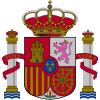
Back Consell de Ministres d'Espanya Catalan Consejo de Ministros (España) Spanish Espainiako Ministroen Kontseilua Basque Conseil des ministres (Espagne) French Consello de Ministros de España Galician Conselho de Ministros da Espanha Portuguese Spaniens regering Swedish
| Consejo de Ministros | |
 | |
 Council Room in the Council Building | |
| Council of Ministers overview | |
|---|---|
| Formed | November 19, 1823 |
| Jurisdiction | Government of Spain |
 |
|---|
The Council of Ministers (Spanish: Consejo de Ministros) is the main collective decision-making body of the Government of Spain, and it is exclusively composed of the Prime Minister, the deputy prime ministers and the ministers (22 as of 2024). Junior or deputy ministers such as the Secretaries of State are not members of the Council (although according to the Constitution they could be, if the Government Act included them, a constitutional provision that until today has not been used). The Monarch may also chair the Council when needed on the invitation of the Prime Minister.
The ministers are proposed by the Prime Minister and formally appointed by the King. There is no requirement for the Prime Minister nor the ministers to be MPs. The ministers are the heads of a ministerial department and receive the title of "Minister". In addition to the ministers that are the head of a department, there may be ministers without portfolio, who are entrusted responsibility for certain government functions.
The Council is the main collective decision-making body of the government and the only one constitutionally recognized but ministers can also meet through other government bodies such as the Government Delegated Committees. The Delegated Committees are created by the Council and composed by ministers and secretaries of state which deal with minor issues that may affect more than one ministry.
The Secretary of the Council of Ministers is the Minister of the Presidency. It is regulated by Article 98 of the Spanish Constitution and by article 5 of the Government Act of 1997.